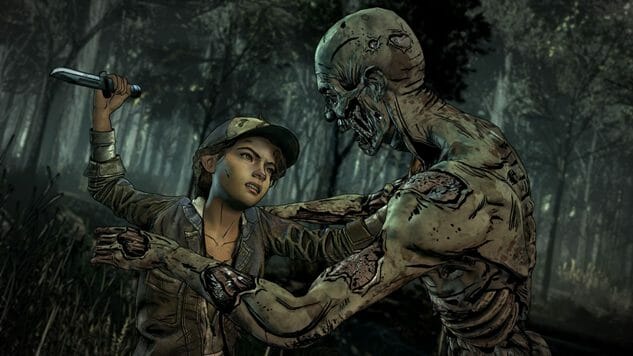The videogame industry is broken, and it’s immoral to support it. It’s built on the exploitation of its workers, and every dollar spent on it supports and encourages that exploitation. All of us who buy games are complicit, and for that reason we should stop.
Last Friday Telltale Games laid off 225 of its 250 employees, just a few days before the release of the latest episode of its signature game, The Walking Dead. Those employees, who had been working in an unending state of crunch time for years, received no warning, no severance and only a week’s worth of healthcare. Telltale basically expected its employees to devote their entire lives to the company, and thanked them by suddenly shoving them out the door with no support at all.
That same week Capcom shut down Capcom Vancouver, with almost 160 employees losing their jobs. The 13-year-old studio had primarily focused on the Dead Rising series over the last decade. A quick glance at the studio’s Glassdoor page confirms the predictable: before they were let go, Capcom Vancouver’s employees worked in a regular state of crunch, with even the positive reviews mentioning it.
These aren’t anomalies. The videogame industry as we know it wouldn’t exist without crunch time, or the poorly planned staffing cycles that lead to regular layoffs after games ship. The industry assumes that young developers desperate to work in their childhood dream jobs will be willing to sacrifice their free time and personal lives to make sure that the latest zombie game or cartoonish war shooter hits the Xbox and PlayStation in time for Christmas. With few other professional options available, too many of those developers are willing to go along with it. And once that game is on store shelves, there’s a great chance those same workers will then find themselves out of a job.
This is exploitation, pure and simple. Yeah, these workers can find other jobs that don’t demand total control of their time and that offer more security, but not in this industry. The best route is forming your own independent studio, as the original writers of Telltale’s The Walking Dead, Sean Vanaman and Jake Rodkin, did; that’s an extremely risky and unlikely opportunity, though, that the vast majority of developers won’t ever have. Most developers will remain bound to the same uncaring machine that has probably chewed them up and spat them out more than once before. It’s absurd that this multi-billion dollar entertainment business acts like it couldn’t exist without the total, all-consuming commitment of its workers, and unforgivable for anybody to act like the burden to change should be placed on the rank-and-file employees and not on the companies and executives who built and profit from such an exploitative system.
Game developers should unionize. That’s how the contract workers who make up the bulk of employees on Hollywood productions take care of themselves, lending some stability and security to what could be just as unstable and exploitative a situation as the one game developers find themselves in. Unionizing isn’t easy, though, and the industry wouldn’t hesitate to bring in scabs. In fact Telltale already seems poised to do something similar to finish off the last season of The Walking Dead; they’ve announced conversations with unspecified “partners” to complete the cancelled final two episodes, but since the team that worked on that game has been laid off, any extra work on it would presumably be done by different workers. Unionizing would be in the best long-term interests for all game developers, but it’s a massive short-term risk that could ruin careers if it fails, so it’s a little understandable why that movement hasn’t fully taken hold yet.
Since the videogame industry refuses to reform itself, and until the workers are able to bear the risk of unionizing, it becomes the responsibility of conscientious customers to try and force change. Giving money to major publishers and studios that enforce crunch time supports a system built on the unhealthy and inhumane exploitation of workers. This has been a problem for many years, and the industry has done nothing to address it. For change to happen, it’ll have to come from the source of the money, from the consumers who drove the business to more than $100 billion in revenue in 2017. By continuing to buy games made under these conditions, consumers are perpetuating these exploitative labor practices. The moral, ethical and responsible move would be to stop buying games made in that kind of environment.
That doesn’t mean giving up videogames entirely. Many independent studios and individual designers that avoid the unhealthy conditions found in so many major studios sell their games directly through the internet. You can find a large number of such games at a site like itch.io, and many of them are far more intriguing than yet another big budget action blockbuster.
Until they unionize, the artists making those kinds of adolescent power fantasies have no power at all, other than leaving the industry they’ve been trained and educated to work in. The people with the money have the power, and that means the people best positioned to force the industry to treat its employees responsibly are the players who are buying these games. If the videogame industry is ever going to be fixed (outside of unionization or legal intervention), it’ll be when consumers en masse stop spending their money to support a broken and immoral system rigged to only benefit ownership. This is the biggest issue facing games today, and it can’t be ignored by anybody, from executives to workers to consumers.
Garrett Martin edits Paste
’s comedy and games sections. He’s on Twitter @grmartin.